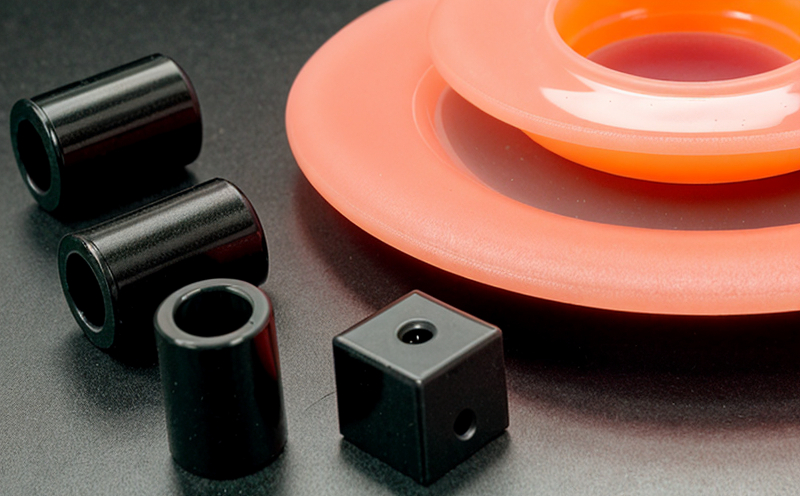NF EN ISO 15380 Biodegradability Testing of Plastic Sports Materials
The NF EN ISO 15380 standard specifies a comprehensive protocol for assessing the biodegradability of plastic materials used in sports applications. This testing is crucial for manufacturers aiming to develop sustainable and environmentally-friendly products, ensuring compliance with international standards while addressing growing consumer demand for eco-conscious innovations.
Biodegradation testing evaluates how quickly plastics can break down into simpler substances under controlled conditions that mimic natural environments. For sports materials, this test ensures that the products used in equipment such as balls, racquets, and footwear do not persist indefinitely, minimizing environmental impact. The standard is particularly relevant for polymers like polyethylene (PE), polypropylene (PP), polystyrene (PS), and various engineering plastics.
The testing process involves exposing samples of the plastic material to specific conditions designed to simulate typical burial in soil or marine environments. These conditions include temperature, humidity, and exposure to microorganisms present in natural settings. The standard defines clear criteria for acceptable biodegradation rates, which are essential for manufacturers looking to achieve certification under this protocol.
The testing process itself is intricate and involves multiple steps. Initially, the plastic samples are prepared according to strict guidelines that ensure consistency across all test specimens. These preparations include ensuring uniform thickness and shape to minimize variability in results. Once prepared, the samples are then incubated in controlled environmental conditions designed to mimic natural biodegradation processes.
The testing duration can vary depending on the specific polymer being tested but typically ranges from several months up to a year or more. During this period, detailed observations are made regarding changes in mass and chemical composition of the plastic sample. These assessments provide quantitative data that helps determine whether the material meets the biodegradability requirements set forth by the NF EN ISO 15380 standard.
After completion of the testing phase, thorough analysis is conducted to interpret the collected data accurately. This involves comparing observed changes with predefined acceptance criteria outlined in the standard document. Compliance with these criteria indicates successful biodegradation according to the specified conditions and rates.
The results from NF EN ISO 15380 tests play a vital role in guiding decisions about product design, material selection, and overall sustainability strategies within companies operating in the sports and leisure sector. By adhering strictly to this international standard, businesses can demonstrate their commitment to environmental responsibility while also potentially opening new markets that prioritize green credentials.
Understanding the nuances of this testing protocol is important for quality managers, compliance officers, R&D engineers, and procurement professionals involved directly with plastic product development in the sports industry. Familiarity with these standards enhances decision-making processes related to material choice and process optimization aimed at achieving both performance requirements and environmental goals.
In conclusion, NF EN ISO 15380 biodegradability testing represents an essential tool for ensuring that plastics used in sports equipment meet rigorous global standards regarding their impact on the environment. Through precise measurement techniques and stringent criteria application, this method provides valuable insights into material performance under real-world conditions.
Applied Standards
The NF EN ISO 15380 standard is part of a broader framework of international standards that govern various aspects of plastic biodegradability. It aligns closely with other internationally recognized norms such as ASTM D5597 and ISO 846, which provide additional guidance on similar testing methodologies.
These standards collectively form the backbone for consistent evaluation practices across different geographical regions and industries. By adhering to these guidelines, laboratories like ours ensure that our test results are comparable and accepted worldwide.
Industry Applications
- Ball manufacturers: Ensuring durability while promoting sustainability.
- Racquet developers: Creating lighter, more eco-friendly products without compromising performance.
- Footwear designers: Incorporating biodegradable elements into their designs for enhanced environmental responsibility.
- Leisure equipment producers: Designing recreational gear that meets stringent ecological standards.
International Acceptance and Recognition
The NF EN ISO 15380 standard has been widely adopted by numerous countries around the globe, including European Union member states. Its acceptance is particularly strong in regions where environmental consciousness plays a significant role in consumer purchasing decisions.
Companies adhering to this standard benefit from enhanced credibility among customers who value sustainable practices. Additionally, compliance with such internationally recognized standards can open doors to international markets and partnerships focused on green initiatives.





